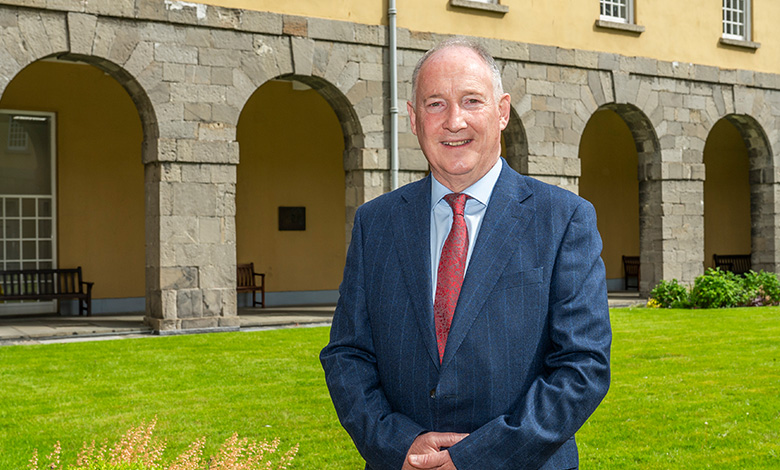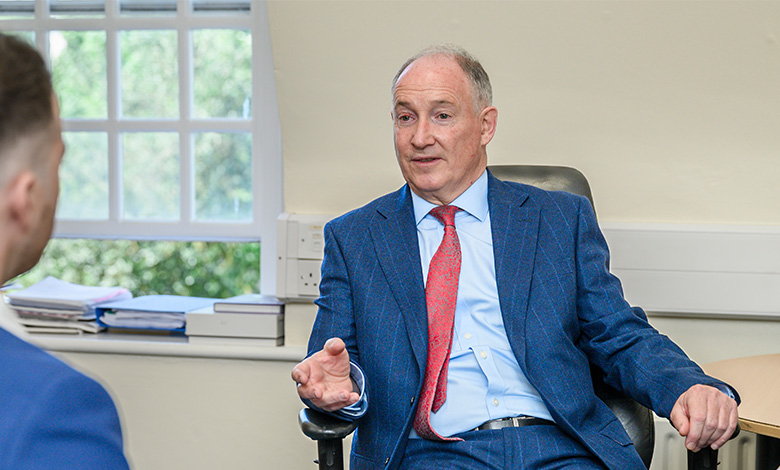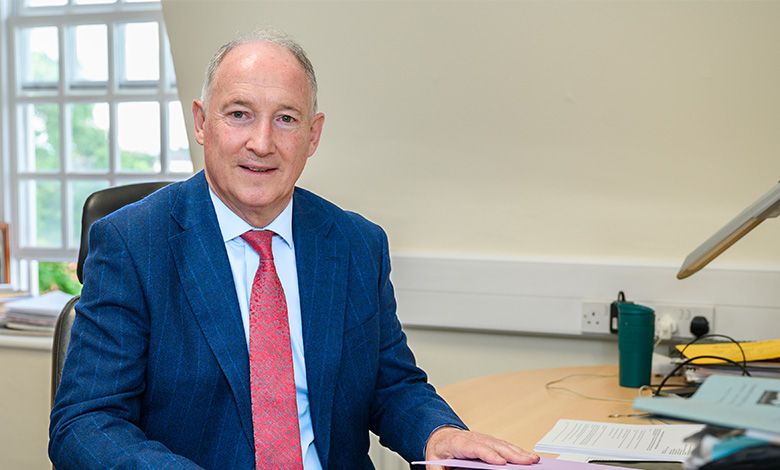HSE Procurement: ‘A serious player’

As he prepares to step down later in 2024, National Director of Procurement for the Health Service Executive (HSE), John Swords, reflects on a career in health spanning four decades with the navigation of major procurement challenges in an ever-evolving health service with increasing patient care demands.
Currently overseeing the work of the largest purchaser in the State, an annual procurement spend of €4.9 billion, and supporting the delivery of public health services, Swords wryly quips that an ostensibly temporary deployment to the HSE’s finance department in 1983 has led him on a “winding and highly enjoyable path”.
Among his major achievements sits the development and delivery of the Procurement Sourcing Plan, compliance improvement, professionalisation of procurement staff and the roll-out of the National Logistics Service, alongside support for the national finance reform and stabilisation programmes.
Illustrative of the nature of the work undertaken by HSE Procurement and the health service in general, Swords is not easing into retirement. Instead, he continues to oversee the procurement service to support the Sláintecare rollout of six new HSE health regions introduced to replace hospital groups and community healthcare organisations.
It is a move which Swords describes as “progressive and brave” but one he believes will be immensely beneficial.
“Before now, focus and attention was on central management out to the Hospital Groups (HGs) and Community Healthcare Organisations (CHOs). The emphasis of Sláintecare is to bring those services closer to the patient through the six regions.
“The six Regional Executive Officers (REOs) now have the authority within their areas but also act as a collective authority. While those areas grow services will evolve as the health sector landscape changes. The National Distribution Centre (NDC) in Tullamore, County Offaly, our sourcing element of contracts, compliance improvement and business systems will play a big role in supporting the REOs in patient-focused service delivery.
In the context of this change, procurement will remain centralised, something Swords describes as “positive” with maximised opportunities to support patient care. However, he recognises that major system change, and the introduction of a single financial system is not without its difficulties.
The new Integrated Financial Management and Procurement System (IFMS) is the national single, integrated financial management and procurement system for the health sector.
“The marketplace has had to live with us through the change and initial disruption, but the IFMS brings structure to the process that we are introducing internally.”
Reflecting on the implementation of change, Swords acknowledges: “It has been challenging and it has required a lot of investment at all levels internally and externally, but overall, it has been a success.
“The IFMS is at an early stage, yet it has had a significant impact already and we have started to achieve management reports in a way that we did not have before. I am a believer in the IFMS – and have been from day one, it will become the single source of information for procurement to assist the supply base and position our requirements in an accurate way to the market and benefits accrue both sides with that in achieving maximum value supporting patient care delivery
Remit
The remit of HSE Procurement is broad, encompassing four main functions: sourcing and contracting; logistics and inventory management; corporate procurement planning and compliance improvement; and business systems.
While Swords will not oversee the final publication of the 2025 Corporate Procurement Plan, he has been heavily invested in the plan’s creation which will shape the delivery of ensuring supply, compliance, coordinated purchasing, and green procurement.
Future planning
Reflecting on the importance of the forthcoming plan, as a foundation of good governance, Swords points to the impact of Brexit as an example of when HSE procurement excelled and expressed his pride in the response to major disruption.
He estimates that the HSE required companies to amend standards on some 2.5 million line items to ensure supply in the country.
“We worked proactively as a State and began planning some two years before Brexit. We secured a lot of our stock that we would require in the immediate term and in some areas, we doubled up to make sure things did not go wrong. This proved to be the correct approach, particularly when you looked at what happened in the North, where many products, including food, were initially unavailable on shelves.
“We had ample product within the State, but more importantly, we had it in our health service. Therefore, we did not suffer a major knee-jerk reaction.”
The National Director of Procurement admits that this planning was not without its own challenges. In a reality whereby many distribution companies did not understand the source of origin for products, Ireland secured contingencies to enable products to come directly from the European Union, and not through the UK.
Swords chairs the EU-funded Procurement CAWT (Cooperation And Working Together) Group, a partnership between the HSE and the Health and Social Care (HSC) in the North and emphasises the centrality of a positive working relationship between north and south as critical to our future.
Swords believes that recognition of the experience of contingency planning for Brexit served as a model for the HSE’s approach to the pandemic.
Offering a sense of what was required, Swords points out that at one point, the HSE had a contingency plan that anticipated a significant loss of its workforce. While this contingency planning was vital, it also had to be deployed alongside dynamic challenges and uncertainty coupled with unprecedented demand on supply and vital life-saving products and services across the entire State.
“The centralisation of our procurement response was important in this regard,” he says. “It was important also to have a collective approach in government both public and civil services who worked together to ensure decisions were made to protect our population. We were able to look at securing supplies from an Ireland Inc perspective, rather than overseeing local competitions. Ireland acted as one.”
Logistically, Swords oversaw the opening of a warehouse in Ballycoolin, Blanchardstown, near Dublin Airport which enabled product distribution from the runway to across the country in around three-and-a-half hours. In total, HSE procurement managed some 298 flight deliveries filled with medical products.
Swords is the health representative on the board of GS1 Ireland, which delivers global standards across multiple sectors, including healthcare. With a stated intention of retaining the voluntary position after his retirement from the HSE, such is his belief in the track record of a global standardised system for traceability – from product manufacture to patient treatment – to continue to raise health standards post-pandemic.
“We built a system in a very short space of time to track the various types of vaccines, knowing where they were, and where they were being administered in a live environment,” he explains
“It turned out to be a tremendous success because we could track the vaccine from its manufacture, through distribution and then to end use. It also meant we minimised wastage. In a live environment, we were able to see when a vaccine was not being used, and move it, through various temperature requirements, to ensure it could be used. That is something we are very proud of and something that is now being adopted in other jurisdictions across Europe and beyond.
Other examples of success in this area are blood management programmes maintaining efficacy of the product and maximising the efficiencies of blood stock management ensuring minimum wastage of a scarce resource.
Sustainability
Swords is also a member of the HSE Climate Action Steering Group and is leading two key programmes of work in relation to green procurement and procurement decarbonisation trajectory.
In 2023, the HSE launched its Climate Action Strategy 2023-2050, which puts an emphasis on HSE Procurement to reassess the sustainability of the products it purchases. However, as Swords explains, his colleagues recognise their responsibilities and are working in collaboration with markets to maximise the use of sustainable products in patient care.
“In our endeavours to promote sustainability we see many examples of where people are making genuine efforts not to use or use less of certain products and replace them with more environmentally friendly products.
“Our role is to coordinate those innovations and reflect them in our award criteria to encourage the marketplace to adopt and promote sustainable products for patient care.
“We are working hand in glove with the marketplace to improve awareness and use of sustainable products in our services.
Asked to reflect on the most challenging times of his long-standing career, Swords admits that the early days of developing HSE Procurement as a central service were challenging.,. However, he indicates very few “low-points” in an accomplished career.
“I reflect on it as an achievement that HSE Procurement is now recognised as a serious player in the wider health service and put it down to several influencing factors,” Swords states. “Procurement is an enabler, and I would like to think it is seen as a responsive respected support service in delivery of patient care across all disciplines within the health service.
A critical factor is supporting our colleague professionals in the various disciplines in providing professional procurement advice and consistent services. Professional consistency is not success unless it is replicated as and when required supporting patient needs.”
On the journey he would like to see HSE Procurement take after his departure, Swords concludes: “On my departure I reflect on the numerous occasions where my colleagues responded above and beyond their normal duties to support people internally and externally, patients, and colleagues, at a particular time of need. This was something I was particularly proud of and I would hope this ethos of goodness will be retained and encouraged.
On reflection with the numerous changes that have happened in health care during my career I ponder on the challenges of change and my belief is while change is challenging it brings opportunity which is good. Reflecting on the people that I have worked with and the good and goodness I have come across and matching the two, lends itself to compassionate patient care.
Speaking of his retirement from the HSE, Swords remarks: “In making a decision to retire my heart tells me that I want to stay but my head says it is a time for change and I regard it as a reset.
“On reflection on the past years in the public sector, I think of all the wonderful people that I have come across and I thank them for the support they gave me during my career. “On reflection, it has been a privilege”.
Profile: John Swords
 Outside of work, Swords regards himself as being lucky in life and has interests in sport and also enjoys walking. He places an emphasis on the significance of “giving something back” hence his involvement in numerous associations including schools, residents, businesses and local clubs, some of which will be continued in retirement.
Outside of work, Swords regards himself as being lucky in life and has interests in sport and also enjoys walking. He places an emphasis on the significance of “giving something back” hence his involvement in numerous associations including schools, residents, businesses and local clubs, some of which will be continued in retirement.







